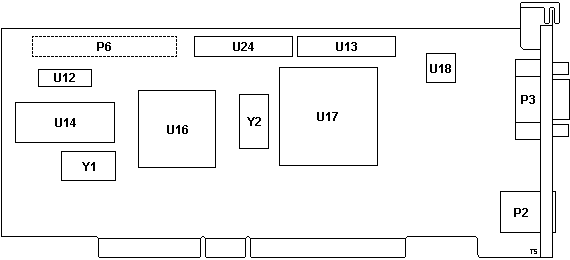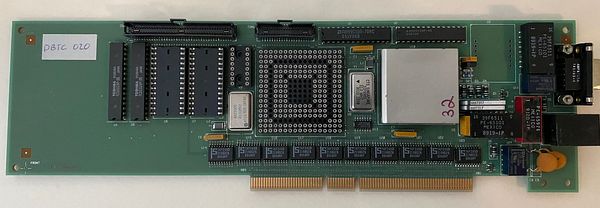|
@8FA0.ADF IBM LANStreamer MC 32 Adapter
bk8w6000.boo Token-Ring Network LANStreamer Adapters
TRMLS323.EXE IBM LANStreamer MC32 Diagnostics/Option Diskette v2.0 (zipped image)
TRMLS321.EXE IBM LANStreamer MC32 Adapter Driver Diskette v3.10 (NDIS 2.0) (zipped image)
TRPALS4.EXE IBM Auto LANStreamer PCI Adapter NDIS3 Device Drivers v1.03 (WfW/95/NT) (zipped image)
WWDU.BIN LANStreamer SCO Unix drivers for ALS, LS, and EtherStreamers (readme)
Streamers - General Information
LANStreamer MC 32
LANStreamer Prototype
Known Problems
Data Integrity Problems with L-S
LANStreamer Not Seen Under NT4
W95 Configurable Settings
ADF Sections
LANStreamer MC 32 "Dorado Beach", FRU P/N 92F8941 (old)
![Front (92F8941) [P]](/other/img/photo.gif)
![Back (92F8941) [P]](/other/img/photo.gif) / 74G0098 (new)
/ 74G0098 (new)
![Front (74G0098) [P]](/other/img/photo.gif)
![Back (74G0098) [P]](/other/img/photo.gif)
92F8941 (downlevel) uses the 60G0661 / 50G8196 pair
74G0098 uses the 74G0107 / 63G9811 pair

P2 RJ45 port
P3 DE9 port
P5 (back) pads for debug header
P6 pads for debug header
U12 MAC address ROM
U13 CXK5971AP-35 8Kx9 SRAM
U14 60G0661 or 74G0107 µcode ROM
|
U16 50G8196 or 63G9811 MCA BM
U17 50G8180(ESD) TR protocol
U18 NS 93F2932 TR front end
U24 Am99C10A-10 256x48 CAM
Y1 40.00000 MHz osc (MCA BM)
Y2 32.0000 MHz osc (TR) |
U13 & U24 Address match RAM and CAM
used for group address matching and multi-port bridge routing information
matching.
U16 50G8196 or 63G9811 MCA bus master
interface chip "Maunakea".
U17 50G8180(ESD) Token Ring protocol
chip "Huntingdale".
Does NOT support FDX.
LANStreamer Prototype

This is one of the first LANStreamer test cards ever made. You can see the
sticker reads "DBTC0020". That is "Dorado Beach Test Card 20". It has a number
of interesting features.
For starters, the key ASICs are socketed because this was the first card
using those new "Maunakea" streamer chips (U9; missing) and the "Huntingdale"
TR chip (U10; silver-cap).
Notice the two debug headers along the top (CON1 & CON2). They were used
to connect either an HP logic analyzer or a UC processor debug tool called the
DASH/DAB. Solder pads for these connectors can be found even on the production
cards (the smaller connector was moved to the solder side).
Also of note is the 64 KB RAM at the left side of the adapter (U4 & U5).
That RAM did not appear on the production boards. There was 2 KB of RAM inside
the TR chip (even at this stage of development) and that was all the RAM the
production-level LAN Streamers ever had. But since this was the first TR
adapter without the 64 KB "shared RAM" it wasn't obvious whether the microcode
would be able to operate with only 2 KB of RAM. The external memory was added
so that debug could happen with the goal to reduce the footprint to the
smallest amount possible.
There is also an 8 KB RAM and 256 entry CAM above the aluminum TR chip
(Huntingdale). Those memories were used for group address matching and
multi-port bridge ring number matching. They were not directly accessible from
the UC but the protocol handler used them directly in the address match logic.
The CAM was probably the most expensive part on this card and there was a lot
of pressure to remove it. On the Auto LAN Streamer, it's no longer present as a
discrete component, it was moved to the protocol chip (MPC).
The area marked as U3 was an analog front-end plug-in card that was used to
test various new analog designs. The analog front end was extremely sensitive
to noise and was always going through analysis to ensure the best design. There
are two ROM sockets (U6 & U7) but the final cars shipped with a single ROM
of 64 KB. The smaller socket (U8) is where the MAC address ROM was placed.
Known Problems
Slot 8 Incompatibility in 8595 and 9595 (SF2223)
Failure to Obtain IP Address Via DHCP on Token Ring w/ SP2 (Q163383)
Data Integrity Problems with L-S Card FRU P/N 92F8941 (Q131351) (edited)
Symptoms
The following error message appears in the event log after starting Windows
NT on a computer with an IBM LANStreamer network adapter:
Event ID 5009
The description for Event ID ( 5009 ) in Source ( Streamer ) could not be found.
It contains the following insertion string(s): \Device\Streamer1, Streamer1.
0000: 000c0000 00660002 00000000 80001391
0010: 00000000 00000000 00000000 00000000
0020: 00000000 00000000 00000008 0000009d
0030: 00000000
Cause
A data integrity problem was identified with the first
release of the LANStreamer card. Hooks were added to the LANStreamer
driver to minimize the problem. This event log message is logged for the
benefit of IBM development to identify that the adapter has the data
integrity problem.
The affected LANStreamers are 92F8941. The ROM chip and U16
are different from the later 74G0098.
Resolution
Replace the adapter with FRU P/N 74G0098.
Practical Impact
The data integrity "issue" was overblown by IBM. The problem was only
reported on NCR servers, not IBM hardware. It was also very very infrequent and
probably only happened with multiple adapters installed. In any case, the
higher layer protocols (e.g. TCP) would have caught the rare data corruption
anyway.
There was a device driver fix that eliminated the problem, but it had a
performance impact, and since people paid $895 for the NIC, it was fixed
properly later on (in hardware). That's why there were several different part
numbers for the "Maunakea" chip (the revised version probably used the same
codename, perhaps with a "2.0" suffix). The change had zero impact on the
microcode.
W95 Configurable Settings
| Default |
Item |
Values |
| NP |
Enable Hardware Loopback |
N/Y/NP |
| No |
Enable High Priority Xmit |
N/Y |
| Yes |
Enable Xmit at End of Frame In(?) |
N/Y |
| NP |
FIFO Threshold |
0-15 |
| 4 |
High Priority Xmit Threshold |
1-5 |
| 5 |
Max High Priority Xmit Access |
0-5 |
| 18,000 |
Maximum Xmit Frame Size |
0-18000 |
| 31 |
Maximum Transmits |
2-512 |
| 3 |
MCA Bus Type |
-1,000 to 1,000
(over 2,000 each direction) |
|
Card ID |
8FA0 |
| 5 |
MCA Slot Location |
1-8 |
| 20 |
Minimum Adapter Rcv Buffers |
2-512 |
| NP |
Network Address |
Blank-accepts any value |
| 2,048 |
Recieve Buffer Size |
270-18,000 |
(Tested on a Model 77s with Lacuna
planar.)
AdapterId 8FA0 IBM LANStreamer MC 32 Adapter
Adapter Data Rate
This adapter can operate at either 4 Mbps or 16 Mbps.
The adapter data rate MUST be set to the rate of the Token-Ring LAN segment
to which the adapter is connected.
<"16 Mbps">, 4 Mbps
Adapter Media Type Selection
This adapter supports two media types, STP and UTP.
The media type selected MUST be cable connected to the token ring. If not
the adapter will exhibit a LOBE MEDIA FAILURE.
<"STP">, UTP
Adapter I/O address Range
The I/O address field is a six bit field that selects
the I/O address of the adapter. For MC I/O cycles, this dapter is selected
when the MC I/O address is within a 256 byte region. For systems with more
than one LS32, each must be assigned a separate I/O address range.
<"1C00-1CFF (io 1C00-1CFF)>,
2000-20FF, 2400-24FF, 2800-28FF, 2C00-2CFF, 3000-30FF, 3400-34FF, 3800-38FF,
3C00-3CFF, 4000-40FF, 4400-44FF, 4800-48FF, 4C00-4CFF, 5000-50FF, 5400-54FF,
5800-58FF, 5C00-5CFF, 6000-60FF, FC00-FCFF
Interrupt Level
This adapter can use interrupt level: 2, 3, 10 or
11. IRQ3 is prefered.
<"Interrupt 3">, 2, 10,
11
Fairness/Streaming Data Select
This adapter can operate with or w/o arbitration fairness
and with or w/o Data Streaming.
<"Fairness ON/Streaming ON">,
Fairness ON/Streaming OFF, Fairness OFF/Streaming ON, Fairness OFF/Streaming
OFF
Arbitration Level
This adapter can operate on one of thirteen arbitration
levels: 1, 2, 3 or 5 thru E. If more than one LS32 is in your computer,
each must be assigned a separate arbitration level.
<"Level 1">, 2, 3, 4, 5, 6,
7, 8, 9, A, B, C, D, E
Remote Program Load Address Range
The adapter Remote Program Load (RPL) ROM is relocatable
within Micro Channel memory space. The adapter RPL ROM from hex 000C 000
to 000D C000.
<"Disabled" >, C000-C3FF, C400-C7FF,
C800-CBFF, CC00-CFFF, D000-D3FF, D400-D7FF, D800-DBFF, DC00-DFFF
Parity Enable/Monitor Feedback
This adapter provides the capability of generating and
checking data and address parity, plus it can monitor slave device's Selected
Feedback Return Exception signals during DMA operations.
<"Parity OFF/Monitor OFF">,
Parity ON/Monitor OFF, Parity OFF/Monitor ON , Parity ON/Monitor ON
|